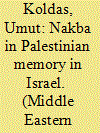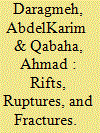|
|
|
Sort Order |
|
|
|
Items / Page
|
|
|
|
|
|
|
| Srl | Item |
| 1 |
ID:
108261


|
|
|
|
|
| Publication |
2011.
|
| Summary/Abstract |
Changes in the international, regional and domestic arenas in the late 1990s resulted in discursive change with regard to interpretation of the Al Nakba in the political and civil societies of the Palestinian Arab citizens of Israel. Apart from fuelling a discursive challenge to the Israeli dominant discourse about the 1948 events, this reinterpretation allowed the Palestinian Arab citizens to discuss the historical roots of the problems they experienced within the Israeli political and civil societal spheres. This article analyses the nature and significance of discursive change of the Palestinian Arab citizens of Israel on the Nakba by referring to its impact on their identity politics as well as their political and civil societal activities.
|
|
|
|
|
|
|
|
|
|
|
|
|
|
|
|
| 2 |
ID:
173126


|
|
|
|
|
| Summary/Abstract |
This article responds to the relative neglect of reading Mahmoud Darwish from a postmodern perspective. Inspired by postmodern theory, we suggest that Darwish after Oslo agreements in 1993 seeks to have a displaced and dialectical encounter with the collective identity; he utilizes a transition from being into becoming, from filiation into affiliation, knowing that this transition mirrors rifts, ruptures, and fractures in the Palestinian historical and geopolitical conditions in the post-Oslo era. By looking at poems written after the Oslo Accords, which were described by Bashir Abu-Manneh as “the root cause of the disintegration and liquidation of Palestinian agency,” we argue that Darwish's persona manifests the postmodern intellectual who is tempted to leave the collective and expatriate himself to hone an independent self and thought that provides a fresh perspective and a new understanding of Palestinian collectivity. While Darwish's pre-Oslo poetry expressed a collective voice, identification, and commitment to the national narrative, after Oslo, he gets more personal and, perhaps, detached from and critical of the nationalist political entities and narratives. Building on theoretical insights from both postcolonial and postmodern intellectuals, we also articulate ways in which the dialectical relation between postcolonialism and postmodernism appears in Darwish's poetry. We find that the persona at times combines, and at other times, fluctuates between, singularity and multiplicity, certainty and suspicion, the collective and the personal, place and space, tradition and innovation, while seeking revision, transition, contingency, dynamism, fluidity in the contemporary, post-Oslo time.
|
|
|
|
|
|
|
|
|
|
|
|
|
|
|
|
|
|
|
|
|